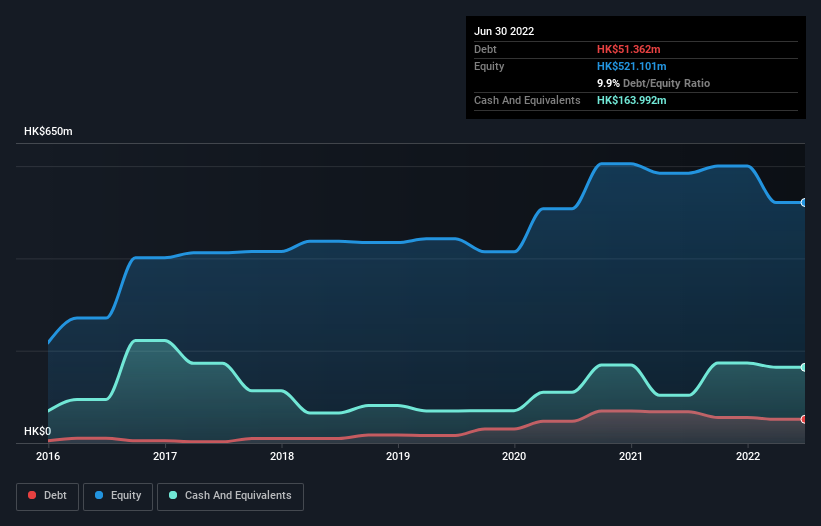
Some say volatility, rather than debt, is the best way to think about risk as an investor, but Warren Buffett famously said that 'Volatility is far from synonymous with risk.' So it seems the smart money knows that debt - which is usually involved in bankruptcies - is a very important factor, when you assess how risky a company is. We note that Vincent Medical Holdings Limited (HKG:1612) does have debt on its balance sheet. But the real question is whether this debt is making the company risky.
Why Does Debt Bring Risk?
Debt assists a business until the business has trouble paying it off, either with new capital or with free cash flow. If things get really bad, the lenders can take control of the business. However, a more frequent (but still costly) occurrence is where a company must issue shares at bargain-basement prices, permanently diluting shareholders, just to shore up its balance sheet. By replacing dilution, though, debt can be an extremely good tool for businesses that need capital to invest in growth at high rates of return. When we examine debt levels, we first consider both cash and debt levels, together.
View our latest analysis for Vincent Medical Holdings
What Is Vincent Medical Holdings's Debt?
You can click the graphic below for the historical numbers, but it shows that Vincent Medical Holdings had HK$51.4m of debt in June 2022, down from HK$67.8m, one year before. However, it does have HK$164.0m in cash offsetting this, leading to net cash of HK$112.6m.

How Healthy Is Vincent Medical Holdings' Balance Sheet?
The latest balance sheet data shows that Vincent Medical Holdings had liabilities of HK$215.7m due within a year, and liabilities of HK$20.3m falling due after that. Offsetting this, it had HK$164.0m in cash and HK$160.3m in receivables that were due within 12 months. So it actually has HK$88.3m more liquid assets than total liabilities.
It's good to see that Vincent Medical Holdings has plenty of liquidity on its balance sheet, suggesting conservative management of liabilities. Because it has plenty of assets, it is unlikely to have trouble with its lenders. Simply put, the fact that Vincent Medical Holdings has more cash than debt is arguably a good indication that it can manage its debt safely. When analysing debt levels, the balance sheet is the obvious place to start. But ultimately the future profitability of the business will decide if Vincent Medical Holdings can strengthen its balance sheet over time. So if you're focused on the future you can check out this free report showing analyst profit forecasts.
In the last year Vincent Medical Holdings had a loss before interest and tax, and actually shrunk its revenue by 33%, to HK$688m. To be frank that doesn't bode well.
So How Risky Is Vincent Medical Holdings?
While Vincent Medical Holdings lost money on an earnings before interest and tax (EBIT) level, it actually generated positive free cash flow HK$100m. So although it is loss-making, it doesn't seem to have too much near-term balance sheet risk, keeping in mind the net cash. With mediocre revenue growth in the last year, we're don't find the investment opportunity particularly compelling. When analysing debt levels, the balance sheet is the obvious place to start. However, not all investment risk resides within the balance sheet - far from it. We've identified 2 warning signs with Vincent Medical Holdings , and understanding them should be part of your investment process.
At the end of the day, it's often better to focus on companies that are free from net debt. You can access our special list of such companies (all with a track record of profit growth). It's free.
If you're looking to trade Vincent Medical Holdings, open an account with the lowest-cost platform trusted by professionals, Interactive Brokers.
With clients in over 200 countries and territories, and access to 160 markets, IBKR lets you trade stocks, options, futures, forex, bonds and funds from a single integrated account.
Enjoy no hidden fees, no account minimums, and FX conversion rates as low as 0.03%, far better than what most brokers offer.
Sponsored ContentNew: Manage All Your Stock Portfolios in One Place
We've created the ultimate portfolio companion for stock investors, and it's free.
• Connect an unlimited number of Portfolios and see your total in one currency
• Be alerted to new Warning Signs or Risks via email or mobile
• Track the Fair Value of your stocks
Have feedback on this article? Concerned about the content? Get in touch with us directly. Alternatively, email editorial-team (at) simplywallst.com.
This article by Simply Wall St is general in nature. We provide commentary based on historical data and analyst forecasts only using an unbiased methodology and our articles are not intended to be financial advice. It does not constitute a recommendation to buy or sell any stock, and does not take account of your objectives, or your financial situation. We aim to bring you long-term focused analysis driven by fundamental data. Note that our analysis may not factor in the latest price-sensitive company announcements or qualitative material. Simply Wall St has no position in any stocks mentioned.
About SEHK:1612
Vincent Medical Holdings
An investment holding company, researches, develops, manufactures, markets, trades in, and sells medical devices.
Excellent balance sheet slight.
Similar Companies
Market Insights
Community Narratives




